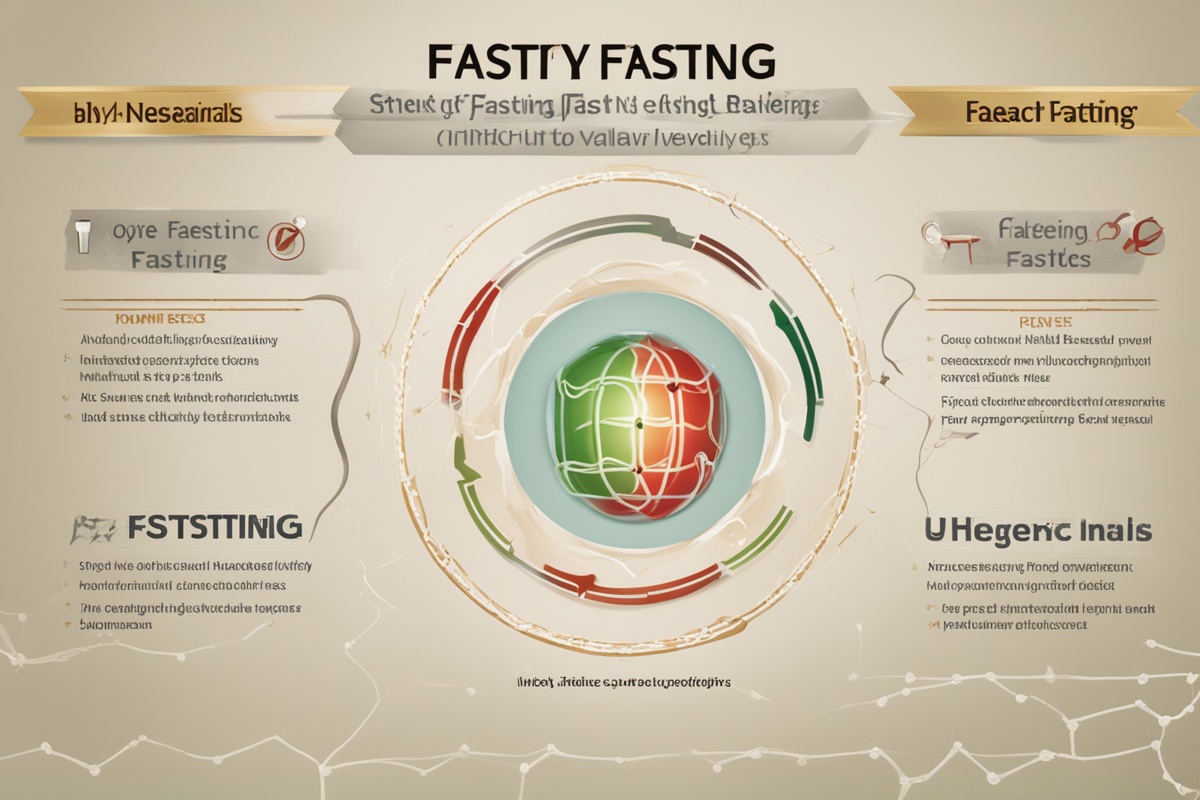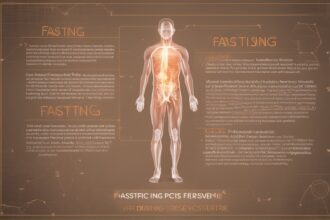Have you ever wondered if skipping a meal or two could actually be good for you? fasting, a practice as old as humanity itself, has gained significant attention in recent years thanks to a growing body of research. fasting studies are shedding light on how this age-old tradition might improve metabolic health, enhance brain function, and even extend lifespan. Whether you’re a seasoned faster or just curious about intermittent fasting, this comprehensive dive into the science of fasting will provide you with evidence-based insights and actionable tips. Let’s explore what the research says about fasting and how you can apply these findings to your life in a safe and informed way. From weight loss to cognitive benefits, the world of fasting research is brimming with possibilities, and I’m excited to unpack it with you.
What Are Fasting Studies Revealing About Health Benefits?
Fasting studies have become a hot topic in the health and wellness community, and for good reason. Research indicates that various forms of fasting—such as intermittent fasting (IF), time-restricted eating (TRE), and prolonged fasting—can offer a wide range of health benefits. For instance, studies have shown that fasting can improve insulin sensitivity and lower blood sugar levels, which is particularly beneficial for individuals at risk of type 2 diabetes (Anton et al., 2018). This is a game-changer for metabolic health, as better insulin sensitivity can help prevent long-term complications associated with blood sugar imbalances.
Additionally, fasting triggers a fascinating cellular process called autophagy, where the body cleans out damaged cells and regenerates new ones, potentially reducing the risk of chronic diseases (Bagherniya et al., 2018). Autophagy is often described as the body’s “housekeeping” mechanism, and its activation during fasting could play a role in slowing aging and preventing conditions like cancer or heart disease. Furthermore, some fasting research suggests that periodic fasting may reduce inflammation, a key driver of many health issues, by altering immune responses in the body. These findings are exciting, but it’s important to approach them with a balanced perspective. Not all benefits are universally applicable, and individual responses to fasting can vary widely based on factors like age, lifestyle, and pre-existing health conditions.
The implications of fasting studies extend beyond just physical health. Emerging research hints at potential benefits for mental well-being, such as reduced stress and improved mood, possibly due to the stabilization of blood sugar levels and the release of ketones during fasting. While more human studies are needed to solidify these claims, the early data from fasting research is promising and encourages us to rethink how meal timing impacts overall wellness. As we continue to explore fasting science, it’s clear that this practice isn’t just a trend—it’s a potential tool for long-term health optimization.
How Does Fasting Impact Weight Loss? Evidence from Research
One of the most popular reasons people turn to fasting is for weight loss, and fasting studies provide substantial evidence to support its effectiveness in certain contexts. Intermittent fasting, which often involves cycles of eating and fasting (like the popular 16:8 method), has been shown to reduce body weight and fat mass in overweight individuals by creating a calorie deficit (Varady et al., 2011). The beauty of intermittent fasting lies in its simplicity—by shortening your eating window, you naturally tend to consume fewer calories without the need for meticulous tracking.
However, the results aren’t a one-size-fits-all solution. Some fasting research suggests that the weight loss benefits of fasting are comparable to traditional calorie restriction, meaning it’s not necessarily superior but offers a flexible alternative for those who struggle with conventional diets (Trepanowski et al., 2017). This is an important nuance to consider—fasting might work wonders for some, but others may find it no more effective than cutting calories through other means. Additionally, fasting’s impact on weight loss can be influenced by factors like diet quality during eating windows. If you’re filling up on processed foods, the benefits of fasting for weight management could be diminished.
Another point worth noting from fasting studies is the potential for improved fat-burning mechanisms during fasting periods. When you fast, your body shifts from using glucose as its primary energy source to burning stored fat, a process known as ketosis. This metabolic switch can enhance fat loss over time, especially when paired with regular physical activity. That said, sustainable weight loss through fasting requires a holistic approach. If you’re considering fasting for weight management, combining it with a nutrient-dense diet and mindful eating habits is key to long-term success. Fasting research continues to evolve, and as more data emerges, we’ll gain a clearer picture of how to optimize this practice for weight control without compromising overall health.
Fasting and Brain Health: What Science Says
Beyond physical health, fasting studies are uncovering fascinating links between fasting and brain health, offering hope for those looking to boost cognitive function or protect against decline. Research suggests that fasting may enhance cognitive performance and safeguard against neurodegenerative diseases like Alzheimer’s. This is largely due to the increase in brain-derived neurotrophic factor (BDNF) during fasting periods, a protein that supports neuron growth and repair (Mattson et al., 2018). BDNF is often likened to “fertilizer” for the brain, helping to strengthen neural connections and improve memory and learning.
Moreover, animal studies have shown that fasting can reduce inflammation in the brain, a key factor in many neurological conditions (Longo & Mattson, 2014). Chronic inflammation is implicated in disorders like Parkinson’s and Alzheimer’s, so any intervention that mitigates this risk is worth exploring. While human studies on fasting and brain health are still emerging, these early findings hint at fasting’s potential as a brain-boosting strategy. Imagine improving focus, clarity, and memory just by tweaking when you eat! Some researchers also speculate that fasting-induced ketosis—where the brain uses ketones instead of glucose for fuel—could provide an alternative energy source that enhances mental resilience.
That said, fasting for brain health isn’t without its challenges. Some individuals report “brain fog” or difficulty concentrating during the initial stages of fasting as their bodies adapt to new energy sources. Fasting studies suggest that these effects are often temporary, but they underscore the importance of easing into fasting rather than jumping in headfirst. As research progresses, we’ll likely see more tailored recommendations for using fasting to support cognitive health, especially for aging populations. For now, the intersection of fasting science and neurology remains a captivating area to watch.
Potential Risks Highlighted in Fasting Research
While the benefits of fasting are promising, fasting studies also point to potential risks that shouldn’t be ignored. For some individuals, fasting can lead to irritability, fatigue, or even disordered eating patterns if not approached mindfully (Johnstone, 2015). These side effects are often referred to as the “hunger hump,” where the body struggles to adjust to new eating patterns, leading to mood swings or low energy. Prolonged fasting, in particular, may cause nutrient deficiencies or muscle loss if not properly managed, especially without adequate protein intake or medical supervision (Soeters et al., 2009).
Moreover, fasting isn’t suitable for everyone. People with certain medical conditions, such as diabetes, eating disorders, or pregnancy, should consult a healthcare provider before starting any fasting regimen. For those with diabetes, fasting can affect blood sugar control and medication needs, posing serious risks if not monitored. Fasting research also highlights the potential for overdoing it—extreme fasting protocols can lead to dehydration, electrolyte imbalances, or even weakened immunity if sustained for too long without breaks. The science is clear: fasting isn’t a magic bullet, and personalization is crucial to avoiding adverse effects.
Another lesser-discussed risk from fasting studies is the psychological impact. For some, the rigid structure of fasting can trigger obsessive thoughts about food or body image, especially in those with a history of disordered eating. This is why experts emphasize the importance of a balanced mindset when approaching fasting. It should be a tool for health, not a source of stress. If you’re new to fasting, start slow and prioritize self-awareness to ensure it’s enhancing, not detracting from, your well-being.
Practical Tips for Starting a Fasting Routine
If the insights from fasting studies have piqued your interest, you might be wondering how to get started. The good news is that fasting can be tailored to fit nearly any lifestyle, whether you’re a busy professional or a fitness enthusiast. The key is to approach it with intention and caution, especially if you’re new to fasting science. Here are some practical tips to help you begin safely and effectively, based on recommendations often highlighted in fasting research:
- Start with a simple approach like the 16:8 method, where you fast for 16 hours and eat during an 8-hour window. This is often easiest for beginners as it aligns with natural sleep cycles.
- Stay hydrated during fasting periods by drinking water, herbal tea, or black coffee—hydration helps curb hunger pangs and supports overall health.
- Focus on nutrient-dense meals when you do eat to ensure your body gets essential vitamins, minerals, and macronutrients to fuel your day.
- Listen to your body; if you feel dizzy, overly fatigued, or unwell, break your fast and reassess your approach. Fasting shouldn’t feel like punishment.
- Consult a doctor if you have underlying health conditions or are on medication, as fasting can affect how your body processes certain drugs or manages chronic issues.
Additionally, consider tracking your progress and feelings during the first few weeks of fasting. Keeping a journal can help you identify patterns, like when hunger hits hardest or when energy levels peak, allowing you to adjust your fasting schedule accordingly. Remember that fasting is highly individual—what works for one person may not work for another. Patience and experimentation are key as you navigate this journey with the backing of fasting studies.
Common Myths About Fasting Debunked by Studies
Despite the growing evidence from fasting research, there are still many misconceptions about fasting circulating online and in casual conversation. These myths can deter people from trying fasting or lead to unrealistic expectations. Let’s clear up a few common myths using insights from fasting studies to set the record straight:
- Fasting slows down your metabolism: Contrary to popular belief, short-term fasting does not significantly slow metabolism and may even slightly boost it due to increased norepinephrine levels, a hormone that enhances energy expenditure (Zauner et al., 2000).
- You’ll lose muscle mass: While prolonged fasting without adequate protein can lead to muscle loss, intermittent fasting paired with resistance training can preserve muscle mass effectively (Moro et al., 2016).
- Fasting is the same as starving: Fasting is a controlled, intentional practice, unlike starvation, and studies show it can be done safely with proper planning and attention to nutritional needs (Johnstone, 2015).
These myths often stem from a lack of understanding about how fasting works on a physiological level. Fasting science shows that when done correctly, fasting is not about deprivation but about strategic timing to optimize health outcomes. By staying informed through credible fasting research, you can separate fact from fiction and make empowered decisions about whether fasting is right for you.
In conclusion, fasting studies are opening up a world of possibilities for improving health, from weight management and metabolic improvements to brain function and cellular repair. The science behind fasting—whether it’s intermittent fasting, time-restricted eating, or longer fasts—demonstrates that this practice can be a powerful tool when done correctly. However, it’s not without its challenges, and the key takeaway from fasting research is to approach it with knowledge and caution. Personalization is everything; what works for one person may not work for another, and listening to your body is paramount. By starting small, staying informed through credible fasting studies, and seeking professional guidance if needed, you can explore the benefits of fasting while minimizing risks. Have you tried fasting before, or are you inspired to give it a shot based on the latest research? Let us know your thoughts, and remember to keep learning as new fasting science emerges to guide us toward healthier, more balanced lives!
References
- Anton, S. D., Moehl, K., Donahoo, W. T., Marosi, K., Lee, S. A., Mainous, A. G., … & Mattson, M. P. (2018). Flipping the metabolic switch: Understanding and applying the health benefits of fasting. Obesity, 26(2), 254-268.
- Bagherniya, M., Butler, A. E., Barreto, G. E., & Sahebkar, A. (2018). The effect of fasting or calorie restriction on autophagy induction: A review of the literature. Ageing Research Reviews, 47, 183-197.
- Johnstone, A. (2015). Fasting for weight loss: An effective strategy or latest dieting trend? International Journal of Obesity, 39(5), 727-733.






